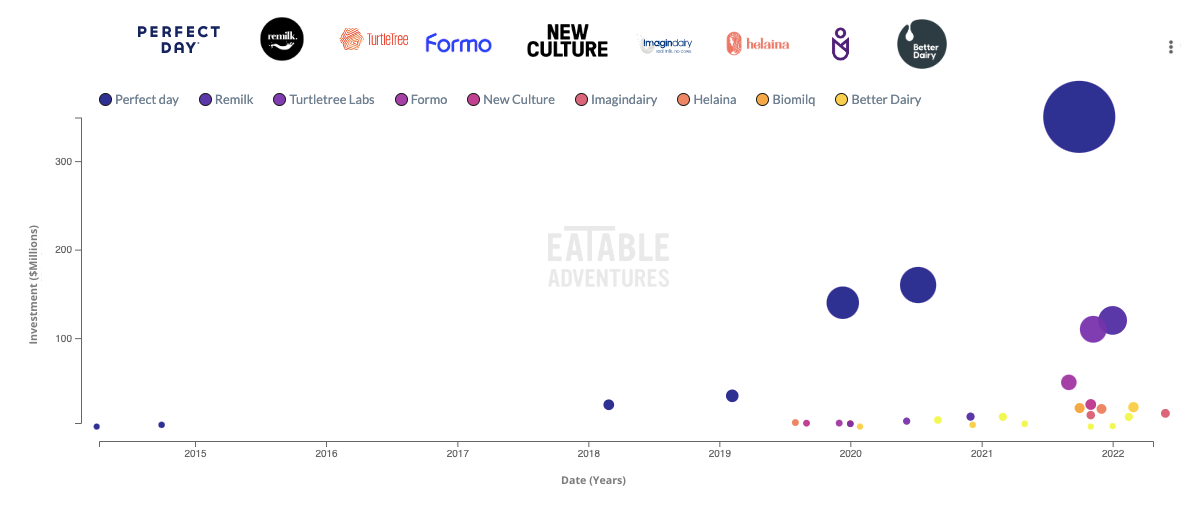In the dairy industry, cell cultures and fermentation techniques are beginning to demonstrate industrial and commercial viability, as shown by the growth of investment in this sector and the emergence of new startups using these technologies as their foundation. Proof of this is that investment in the dairy segment has tripled in 2021, compared with 2020, according to Dealroom data analyzed by Eatable Adventures. Also, according to data from The Good Food Institute, fermentation companies have raised $1.7 billion, which accounts for one-third of all investments in alternative proteins.
Research, innovation, and technology make it possible to develop new production and food transformation models that allow us to improve existing products and create new ones. By remaking the same proteins and fats from dairy, but without animals, formulators are trying to create dairy alternatives that closely resemble traditional dairy products, thanks to disruptive technologies like cell agriculture and fermentation.
The following extract from the FoodTech Market Intelligence Report – Alternative Dairy by Eatable Adventures highlighting the technologies and startups debuting in the Dairy Industry demonstrated that precision fermentation continues to gain momentum among new startups in the sector.

From Eatable Adventures data, we find that in 2021 the alternative dairy fermentation startup, Perfect Day, debuted the fermentation investment profile after receiving $350M in funding, followed by Remilk at the beginning of 2022, receiving $120M.
Additionally, according to more Eatable Adventures data, we can state that precision fermentation technology is highly mature at the moment in terms of investments, meaning that the fascinating technology that cell culture is, is still ripe for innovation and is estimated to grow exponentially in the upcoming years.

Precision fermentation is not only very mature in terms of investment, but also in terms of technology development. Foods containing ingredients made with this technology have been around for decades, and we are eating them on a daily basis. A recent article by Sonalie Figueiras from Green Queen features different precision fermentation foods and products we have been consuming, including enzymes used in food production (e.j pectinases which help make fruit juices clear), vitamins we take in supplement form or powder, natural flavors added to certain foods (e.j vanilla flavoring), and even cheese (rennet, a key ingredient in cheese production, is produced via precision fermentation).
On the other hand, cell-cultured technology is a promising technology for animal-based proteins but still needs further development and acceptance.
By using this method, meat is produced with the same types of cells arranged in the same structure as animal tissues, delivering identical sensory and nutritional properties as conventional meat. Nevertheless, there are still many obstacles for cellular agriculture to overcome such as regulatory aspects, consumer perception, and socio-political challenges, but that doesn’t negate the fact that is a rising trend that entrepreneurs and investors, and companies should follow.
Accelerating the market through Open Innovation Programs
In this food revolution, open innovation programs and synergies between big companies and startups are of major importance to accelerate growth and assist new startups to reach their objectives. For instance, Mylkcubator, the global incubation program led by Pascual Innoventures, and Eatable Adventures, recently launched its second edition and are currently seeking projects with innovative solutions in the cellular agriculture spectrum for the dairy industry.
If you have THE idea or project regarding disruptive innovation in the dairy industry using cell agriculture technology, visit the official website mylkcubator.com and get to know all the details about the program.
For further details regarding Mylkcubator, click here.
